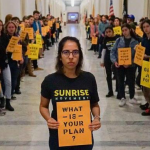The Global Pact for the Environment and the Sustainable Development Agenda
Date: September 25, 2019, 5:15pm – 7:30pm; Reception 7:30pm
Location: Columbia Law School, Jerome Greene Hall, Room 101
Date: September 25, 2019, 5:15pm – 7:30pm; Reception 7:30pm
Location: Columbia Law School, Jerome Greene Hall, Room 101

By Solina Kennedy
September 20, 2019
In this interview, the second of the Climate Crisis, Global Land Use and Human Rights series, Julie Maldonado, Associate Director at Livelihoods Knowledge Exchange Network (LiKEN) and Co-Director of Rising Voices: Climate Resilience through Indigenous and Earth Sciences, discusses the importance of centering Indigenous wisdom and perspectives and relational-based approaches in the pursuit of just climate change actions.
Date: September 12, 2019, 10am-11:30am EST/4pm-5:30pm CEST
Location: Online

By Solina Kennedy
September 2, 2019
In this interview, the first of the Climate Crisis, Global Land Use and Human Rights series, Annie Signorelli, Project Manager for Renewable Energy and Human Rights at the Business and Human Rights Resource Centre (BHRRC), discusses the critical need for embedding human rights, especially those of indigenous communities, within the renewable energy sector, and the hurdles faced in pursuing environmental justice without compromising human rights.

By Nathan Lobel
August 20, 2019
The climate crisis will reshape our relationships to land around the world. Journalist David Wallace-Wells warns that, once the planet warms 2°C above preindustrial levels — the target set by the Paris Agreement — “major cities in the equatorial band of the planet will become unlivable,” and 400 million more people will suffer from regional water scarcity. At 3°C of warming — the expected result of Paris Agreement policy pledges by 2100 — world agriculture systems could struggle to meet global caloric demand and droughts are projected to plague much of India and Pakistan, the Mediterranean, Central America, the western United States, and Australia. At 4°C, closer to where current policies will lead us by the century’s close, rising seas could swallow land currently occupied by 470 to 760 million people.

By Paolo Natali, Suzanne Greene, and Perrine Toledano
August 14, 2019
The embedded carbon content of any product is largely unknown to the final consumer. Very few consumers are aware of the carbon that has been generated in the production and delivery of products and, as a consequence, virtually nobody takes action to abate these emissions. The MIT Sustainable Supply Chains initiative, Columbia Center for Sustainable Investment, and Rocky Mountain Institute’s Materials initiative have formed a working group to engage minerals producers, end users, investors, and other stakeholders interested in carbon accounting.

By Nicolas Maennling
April 15, 2019
Ørsted, formerly Danish Oil and Natural Gas Energy, is one of few energy companies to transition primarily to renewable energy from fossil fuels. CCSI had the pleasure to talk with Jakob Askou Bøss, head of strategy and communication at Ørsted, about lessons learned from Ørsted’s transition, and their implications for other energy companies hoping to succeed in a decarbonized economy.

By Nathan Lobel
February 26, 2019
What the Green New Deal gets that the carbon tax misses: embedded in political realities, the seemingly first-best option can become at best insufficient to achieve its original policy objectives, and at worst a costly distraction from other more viable alternatives.
Date: February 4th, 12:00pm – 6:30pm
Location: Side Event to Mining INDABA, Hotel SunSquare Cape Town City Bowl, 23 Buitengracht St, Cape Town
Date: September 26, 2018, 1:00pm – 6:00pm
Location: Faculty House, Columbia University, New York